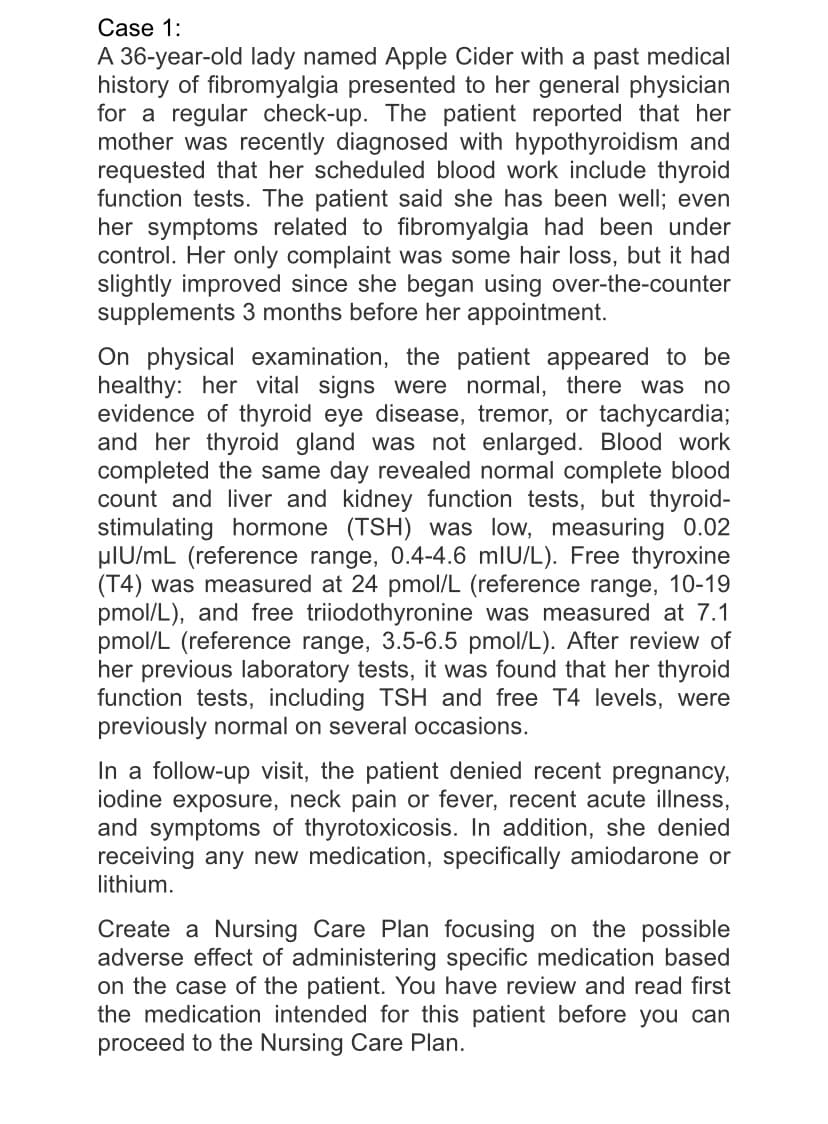Case 1: A 36-year-old lady named Apple Cider with a past medical history of fibromyalgia presented to her general physician for a regular check-up. The patient reported that her mother was recently diagnosed with hypothyroidism and requested that her scheduled blood work include thyroid function tests. The patient said she has been well; even her symptoms related to fibromyalgia had been under control. Her only complaint was some hair loss, but it had slightly improved since she began using over-the-counter supplements 3 months before her appointment. On physical examination, the patient appeared to be healthy: her vital signs were normal, there was no evidence of thyroid eye disease, tremor, or tachycardia; and her thyroid gland was not enlarged. Blood work completed the same day revealed normal complete blood count and liver and kidney function tests, but thyroid- stimulating hormone (TSH) was low, measuring 0.02 plU/mL (reference range, 0.4-4.6 mlU/L). Free thyroxine (T4) was measured at 24 pmol/L (reference range, 10-19 pmol/L), and free triiodothyronine was measured at 7.1 pmol/L (reference range, 3.5-6.5 pmol/L). After review of her previous laboratory tests, it was found that her thyroid function tests, including TSH and free T4 levels, were previously normal on several occasions. In a follow-up visit, the patient denied recent pregnancy, iodine exposure, neck pain or fever, recent acute illness, and symptoms of thyrotoxicosis. In addition, she denied receiving any new medication, specifically amiodarone or lithium. Create a Nursing Care Plan focusing on the possible adverse effect of administering specific medication based on the case of the patient. You have review and read first the medication intended for this patient before you can proceed to the Nursing Care Plan.
Case 1: A 36-year-old lady named Apple Cider with a past medical history of fibromyalgia presented to her general physician for a regular check-up. The patient reported that her mother was recently diagnosed with hypothyroidism and requested that her scheduled blood work include thyroid function tests. The patient said she has been well; even her symptoms related to fibromyalgia had been under control. Her only complaint was some hair loss, but it had slightly improved since she began using over-the-counter supplements 3 months before her appointment. On physical examination, the patient appeared to be healthy: her vital signs were normal, there was no evidence of thyroid eye disease, tremor, or tachycardia; and her thyroid gland was not enlarged. Blood work completed the same day revealed normal complete blood count and liver and kidney function tests, but thyroid- stimulating hormone (TSH) was low, measuring 0.02 plU/mL (reference range, 0.4-4.6 mlU/L). Free thyroxine (T4) was measured at 24 pmol/L (reference range, 10-19 pmol/L), and free triiodothyronine was measured at 7.1 pmol/L (reference range, 3.5-6.5 pmol/L). After review of her previous laboratory tests, it was found that her thyroid function tests, including TSH and free T4 levels, were previously normal on several occasions. In a follow-up visit, the patient denied recent pregnancy, iodine exposure, neck pain or fever, recent acute illness, and symptoms of thyrotoxicosis. In addition, she denied receiving any new medication, specifically amiodarone or lithium. Create a Nursing Care Plan focusing on the possible adverse effect of administering specific medication based on the case of the patient. You have review and read first the medication intended for this patient before you can proceed to the Nursing Care Plan.
Chapter7: Drug Sources, Schedules, And Dosages
Section: Chapter Questions
Problem 18RQ
Related questions
Question
Make a drug study
- Generic name
- Brand name
- Action of the drug
- Dosage/route
- Side/Adverse effects
- Nursing responsibility

Transcribed Image Text:Case 1:
A 36-year-old lady named Apple Cider with a past medical
history of fibromyalgia presented to her general physician
for a regular check-up. The patient reported that her
mother was recently diagnosed with hypothyroidism and
requested that her scheduled blood work include thyroid
function tests. The patient said she has been well; even
her symptoms related to fibromyalgia had been under
control. Her only complaint was some hair loss, but it had
slightly improved since she began using over-the-counter
supplements 3 months before her appointment.
On physical examination, the patient appeared to be
healthy: her vital signs were normal, there was no
evidence of thyroid eye disease, tremor, or tachycardia;
and her thyroid gland was not enlarged. Blood work
completed the same day revealed normal complete blood
count and liver and kidney function tests, but thyroid-
stimulating hormone (TSH) was low, measuring 0.02
plU/mL (reference range, 0.4-4.6 mlU/L). Free thyroxine
(T4) was measured at 24 pmol/L (reference range, 10-19
pmol/L), and free triiodothyronine was measured at 7.1
pmol/L (reference range, 3.5-6.5 pmol/L). After review of
her previous laboratory tests, it was found that her thyroid
function tests, including TSH and free T4 levels, were
previously normal on several occasions.
In a follow-up visit, the patient denied recent pregnancy,
iodine exposure, neck pain or fever, recent acute illness,
and symptoms of thyrotoxicosis. In addition, she denied
receiving any new medication, specifically amiodarone or
lithium.
Create a Nursing Care Plan focusing on the possible
adverse effect of administering specific medication based
on the case of the patient. You have review and read first
the medication intended for this patient before you can
proceed to the Nursing Care Plan.
Expert Solution
This question has been solved!
Explore an expertly crafted, step-by-step solution for a thorough understanding of key concepts.
Step by step
Solved in 2 steps

Recommended textbooks for you


Comprehensive Medical Assisting: Administrative a…
Nursing
ISBN:
9781305964792
Author:
Wilburta Q. Lindh, Carol D. Tamparo, Barbara M. Dahl, Julie Morris, Cindy Correa
Publisher:
Cengage Learning

Essentials of Pharmacology for Health Professions
Nursing
ISBN:
9781305441620
Author:
WOODROW
Publisher:
Cengage


Comprehensive Medical Assisting: Administrative a…
Nursing
ISBN:
9781305964792
Author:
Wilburta Q. Lindh, Carol D. Tamparo, Barbara M. Dahl, Julie Morris, Cindy Correa
Publisher:
Cengage Learning

Essentials of Pharmacology for Health Professions
Nursing
ISBN:
9781305441620
Author:
WOODROW
Publisher:
Cengage